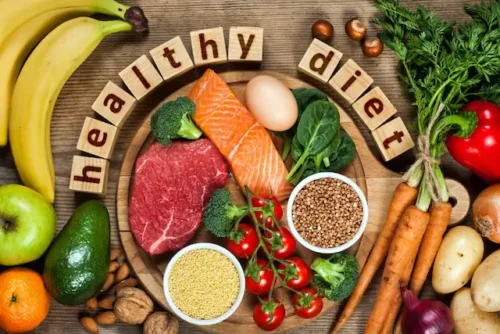
Ways to Improve Your Gut Health
The health of your gastrointestinal (GI) tract, or gut, is vital for your overall health and well-being. An unhealthy gut can contribute to issues like digestive problems, autoimmune diseases, inflammation, mood disorders, and more. With around 70-80% of your immune system located in your gut and ways to improve health, it’s imperative to keep it in tip-top shape.
Unfortunately, gut health issues are very common today. Factors like chronic stress, poor diet, overuse of antibiotics, and more can throw off the balance of gut bacteria, leading to dysbiosis. This is an imbalance between the good and bad bacteria in your gut microbiome.
Restoring gut health is possible with some diet and lifestyle adjustments. Here are ten effective yet simple ways to support your gut health.
Fermented Foods & Probiotics
Fermented foods contain live bacteria called probiotics. These beneficial microbes help promote the growth of good bacteria in your intestinal microbiota. Eating fermented foods on a regular basis helps to decrease the number of bad bacteria and rebalance your gut and improve health.
Make it a point to include a variety of fermented foods in your diet every day. Yogurt, kefir, and aged cheese are good dairy products. For non-dairy options, try tempeh, miso, kimchi, sauerkraut, pickles, or kombucha.
When choosing yogurt and kefir, choose those with live, active cultures. With non-dairy fermented foods, look for unpasteurized to ensure the probiotics are still viable.
In addition to fermented foods and traditional probiotics, considering a supplement like GI Complete powder can provide a comprehensive approach to maintaining a balanced gut. This powder is designed to increase stomach acid production, which helps probiotics survive in the digestive tract and support gut health with its unique combination of ingredients.
Up Your Fiber Intake
Eating plenty of high-fiber foods helps feed the good bacteria in your gut microbiome. It acts as a prebiotic – a type of carbohydrate that probiotics feed on.
Aim for 25-30 grams of fiber daily from vegetables, fruits, whole grains, nuts, seeds and legumes. Some great sources include artichokes, garlic, onions, asparagus, oats, flaxseeds, chia seeds, lentils, and berries. When increasing dietary fiber, be sure to do it gradually and drink plenty of fluids. This will help prevent digestive upset.
Getting enough fiber also adds bulk to stools, making them easier to pass. This prevents constipation and promotes regular bowel movements. To avoid bloating, be mindful of your individual tolerance and increase high-fiber foods slowly.
Stay Hydrated
Drinking an adequate amount of water is vital for optimal gut function. Water helps keep stools soft and bowel movements regular. Not drinking enough water can lead to constipation, exacerbating digestive issues. Aim for around 2 liters or half a gallon of water per day as a general guideline. Increase your fluid intake if you exercise heavily, live in a hot climate, or have increased sweating.
When increasing your water intake, do it gradually over a few weeks. This allows your body time to adapt. Flavor your water with sliced cucumbers, lemons, limes, oranges, or mint to encourage drinking throughout the day.
Ditch Sugar & Processed Foods
Eating too many processed foods and those high in added sugars can disrupt the natural balance of gut bacteria. The sugars and refined carbohydrates in these foods feed harmful bacteria, allowing them to thrive.
This leads to dysbiosis, where the harmful bacteria outnumber the good ones. It also causes intestinal inflammation and can damage the intestinal lining.
Limit candy, soda, processed cereals, fried foods, processed meats, and frozen foods to support a healthy microbiome. Read food labels carefully and choose low-sugar options. Base your diet on fiber-rich foods like vegetables, fruits, legumes, nuts and seeds. Making food at home can help cut down on processed foods and added sugars.
Embrace Polyphenol-Rich Foods
Polyphenols are plant compounds that act as prebiotics. They provide fuel for probiotics and help good bacteria multiply. Polyphenol-rich foods include dark chocolate, green tea, coffee, red wine, berries, nuts, olive oil, and whole grains. Try adding a few servings of these foods daily as part of a gut-healthy diet.
Increase Intake of Prebiotics
In addition to probiotics, prebiotics are equally crucial for nourishing good gut bacteria. Prebiotics are non-digestible fibers that act as fuel for probiotics. They help stimulate the growth and activity of beneficial bacteria like Lactobacillus and Bifidobacteria strains.
Some of the best food sources include Jerusalem artichokes, garlic, onions, leeks, asparagus, bananas, apples, flaxseeds, and dandelion greens.
Aim for a variety of prebiotic foods daily as part of a high-fiber diet. Start slowly and monitor digestion. If gas or bloating occurs, scale back and increase more gradually. Prebiotic supplements like inulin or fructooligosaccharides (FOS) are another option.
Mindful Eating
Practicing mindful eating techniques can improve your gut health in a few ways. Eating too quickly and not chewing thoroughly can lead to gas, bloating, and indigestion. Slowing down your eating gives your body time to produce adequate digestive enzymes and stomach acid to break down foods properly.
This prevents undigested food from sitting in your intestines and feeding harmful bacteria.
Chewing each bite around 25-30 times helps facilitate proper digestion. Putting your fork down between bites and focusing on your food’s taste and textures are other mindful eating tips. Managing stress levels at mealtimes is also key. This helps stimulate healthy digestive secretions and gut motility.
Reduce Stress
Stress hormones may alter gut contractions, contributing to diarrhea or constipation. Stress also increases inflammation and intestinal permeability, allowing bacteria and toxins to leak into the bloodstream. This can trigger widespread inflammation.
To support a healthy gut-brain connection, make stress management a priority. Adopt relaxation practices like meditation, yoga, deep breathing, and mindfulness. Get adequate sleep and take regular breaks to decompress. Keeping stress levels balanced will help promote proper digestive function.
Read More: The Impact of Nutrition on Cognitive Function and Brain Health
Conclusion
Supporting the health of your gut is one of the best things you can do for your overall health and wellness. Focus on eating more prebiotic and probiotic-rich foods, staying hydrated, managing stress, and exercising regularly.
Limit processed foods and added sugars, which can damage your gut. Be mindful of how certain medications affect your microbiome. Start with a few of these gut-friendly tips and build on them over time. With consistency over time, you can achieve optimal gut health and function.


